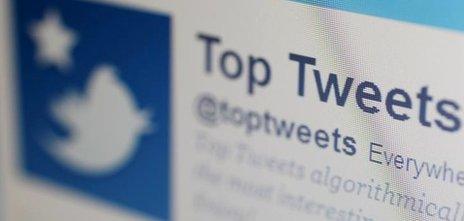Twitter effect: How the hashtag has shaped political debate
- Published

It's been a month dominated by headlines about the granny tax, the pasty tax, even the caravan tax - pithy, even spiky labels attached to complex or arcane aspects of the Budget.
But where do these descriptions come from?
What role does Twitter and in particular the use of hashtags to label discussions, have on the overall national political debate, whether you read Twitter or not?
Some now argue the hashtag has come of age politically. It matters - whether you're on Twitter or not.
'Life of their own'
"These things have taken on a life of their own. We saw that with the Budget in particular," John Rentoul, the Political Tweeter of the Year and the Independent on Sunday's Chief Political Commentator says.
"The hashtag #grannytax came up during the speech, so that by the time the Treasury officials came to brief on the speech afterwards, the phrase was already on the lips of journalists and Treasury officials told me afterwards they were completely knocked back by the reaction against that proposal, which wasn't one of the main things in the Budget," he adds.
So, the argument goes, the best communications brains in the Treasury were skewered by a strange symbol on a keyboard and a nine letter pithy label. The hashtag #pastytax was another.
Andrew Walker, who co-founded Tweetminster - which monitors political chat on Twitter - points out a further quirk, that the apparent political power of the hashtag has shot up at just the moment it is not actually needed to search for topics on the site.
"They started out as labels. Just like labels on a filing cabinet to make it easier to search for messages that you were interested in, in this huge soup of messages that is out there on Twitter. As Twitter enhanced their own search engine, you didn't need hashtags any more because it would find what you were searching for like Google does. The difference is people kept using them."
The question, then, is why? Why did a strange symbol on the keyboard that looks like a noughts and crosses game become so prominent?
"What makes them unique is they describe your emotional state. In any networked environment it is difficult for you to get your nuances across, your tone of voice. They let you describe your tweet but they also enable you to turn it into satire or comedy or make an oblique point," Mr Walker says.
'Polarising effect'
The valuable currency of the hashtag appears to be the pointed, the barbed and the witty. It means some are concerned its rise doesn't just speed up the news cycle yet further, it also coarsens it.
"When things are reduced to hashtags it tends to atomise the terms of debate," argues Milo Yiannopoulos, the editor of The Kernel, an online technology magazine.
"People use it as a boo-hurrah mechanism. My view of political discourse on Twitter is it tends to polarise people. People retreat into safe statements on either end of the spectrum and it is very difficult to express nuance."
Twitter watchers say the hashtags #savethenhs and #nickcleggsfault are another two that helped make the political weather.
But it goes further. A dominant hashtag on a particular topic can become impossible for even the establishment being railed against not to embrace.
#telldaveeverything, a hashtag dripping in sarcasm, suggested people should share their greatest secrets with the prime minister, when the government set out plans to broaden online surveillance.
The Home Office published a response using the #telldaveeverything hashtag.
For Mark Wallace, a PR man and blogger, the hashtag is a vital tool at the heart of an increasingly mainstream platform for conversation amongst the political classes. And so for that reason it matters, whether we as individuals want to embrace it or not.
"There is no way to avoid the impact that Twitter has had on politics, business and communications generally," he says.
"Ultimately people are sitting down all around the country and asking one of the first questions they ask is how will this look on Twitter. This can't be avoided. Whether you are on Twitter or not the messages you will be hearing from politicians will be shaped by it."